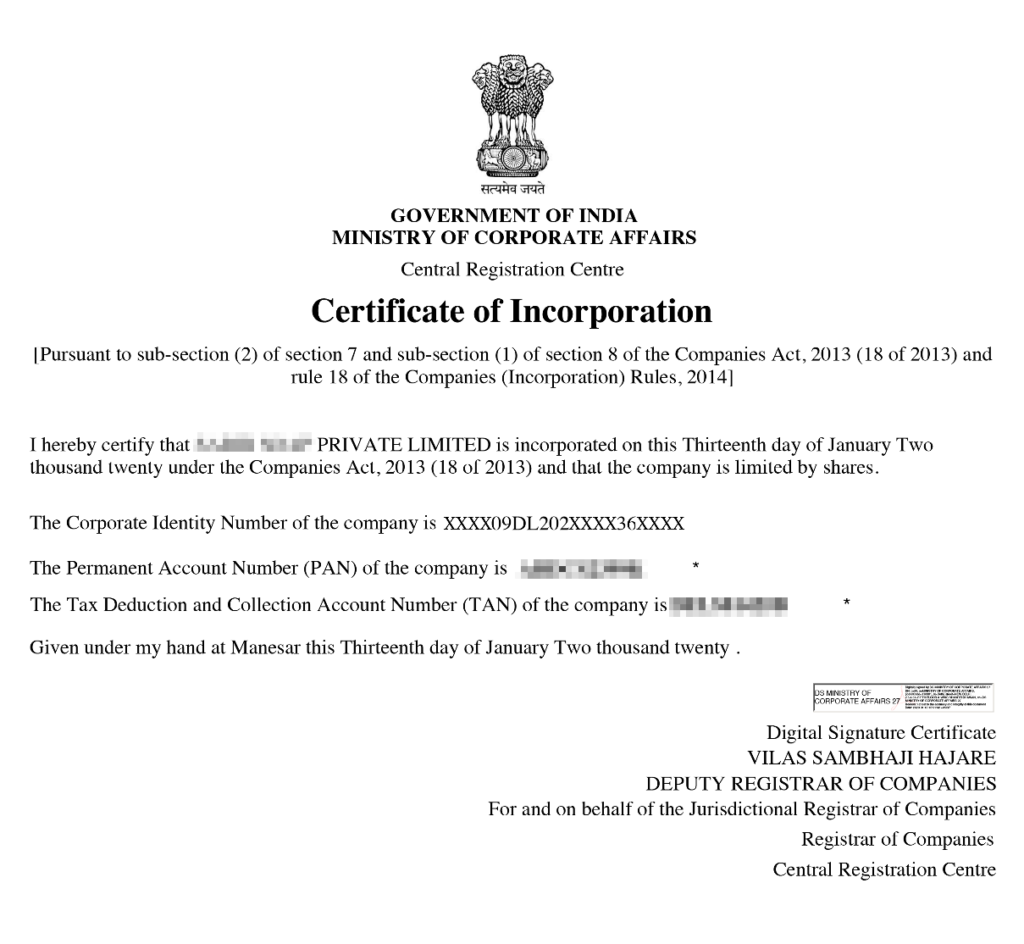Pvt Ltd Company Registration at affordable price!
A private limited company is a type of business entity that is owned by a group of individuals or shareholders.
- No Hidden Charges
- Lowest Price Guarantee
- Quick and Hassle-Free Process Free Expert
- Assistance for Lifetime
Get Expert Consultation
How to Register a Private Limited Company - Step-by-Step Guide
A Private Limited Company Registration is a distinct type of business entity in India, governed by the Companies Act of 2013. This structure allows private ownership of company shares, with no listing on a stock exchange. Such registration offers numerous legal advantages and exceptions due to the limited share transferability and a strong focus on shareholder interests.
Private Limited Companies are a popular choice for entrepreneurs in India. Complying with the Companies Act, 2013, they must have a minimum of two directors and two shareholders, with at least one director being an Indian citizen and resident. This adherence ensures legal compliance and the necessary representation for effective governance.
In most Indian sectors, foreign direct investment (FDI) is permitted up to 100%, with no restrictions on foreign ownership of shares in private limited companies, except for specific industries requiring government clearance. Consequently, many foreign subsidiaries opt to register as Private Limited Companies in India.
The Companies Act of 2013 outlines the procedures and regulations for establishing and operating private limited companies in India.


What is a Private Limited Company?
A private limited company registration offers several advantages to a small group of individuals looking to establish a business entity privately. This business structure is regulated and incorporated under the Ministry of Corporate Affairs, ensuring legal compliance and credibility. Private limited companies provide limited liability protection for their shareholders, restricting share trading to private transactions. With a minimum requirement of two members and a maximum limit of 200 members, this structure offers flexibility while maintaining a manageable size.
What Are the Benefits of Private Limited Company Registration?
Separate Legal Entity
When you opt for private limited company registration, your business becomes a separate legal entity. This means it has distinct rights and responsibilities, setting it apart from its directors. It is legally recognized as a “juristic person.” This separation protects the personal assets of the company’s members, as they aren’t personally liable for the company’s debts and obligations.
Minimum Capital Requirement
In India, there is no set minimum capital requirement for private limited company registration. You can register your company with as little as Rs. 10,000 as the total authorized share capital, offering flexibility to businesses of various sizes.
Tax Efficiency
Private limited companies enjoy tax efficiency, making them an attractive option. They are eligible for corporation tax relief on their profits, leading to significant tax savings and increased profitability. Additionally, dividends distributed to shareholders from private limited companies are subject to lower tax rates.
Uninterrupted Existence
Due to its separate legal status, a private limited company remains unaffected by changes in its membership, such as the departure or demise of a member. It continues to exist independently, providing stability and continuity for the business.
Limited Liability
Private limited companies provide limited liability protection to their members. This means that if the company faces liquidation or insolvency, the members’ liability is restricted to the unpaid amount on their shares, safeguarding their personal assets.
Fundraising
Private limited companies in India can attract funds from venture capitalists and angel investors, making them an appealing choice for external investment. This access to additional financial resources supports the company’s growth and expansion plans.
Transferability of Shares
Shares in a private limited company can be easily transferred to other individuals. Unlike sole proprietorships or partnerships, the process is straightforward, involving the completion of a share transfer form and the transfer of share certificates.
Ease of Management
Private limited companies offer ease of management. They allow for the setup of multiple bank accounts, efficient income and expense management, and other administrative tasks. Various online accounting software providers offer features tailored to private limited companies, streamlining tasks such as annual returns, shareholder meetings, and record-keeping.
Legal Proceedings
As a separate legal entity, a private limited company has the right to initiate legal proceedings and can also be subject to legal actions in its own name. It can bring forward legal claims and defend itself in a court of law.
Dual Partnership
Private limited companies can enter into valid and binding contracts with their members. They also permit individuals to hold multiple positions within the organization, such as being a shareholder, directors, employees, and more.
Foreign Direct Investment (FDI)
Private limited companies allow for Foreign Direct Investment (FDI), enabling foreign entities or individuals to make direct investments in these companies, expanding their investment opportunities.
Incorporating a private limited company provides a wide range of benefits, including limited liability, tax efficiency, and ease of management, making it a preferred choice for many businesses. If you’re looking for private limited company registration services, consider the advantages it offers for your business growth and protecting your assets.
Minimum requirements of Pvt Ltd Company registration
As per the Companies Act 2013, there are minimum requirements that need to be met for company incorporation online.

What are the Eligibility Criteria for Registering Private Limited Company in India?
To initiate the registration of a Private Limited Company in India, it is imperative to meet specific prerequisites encompassing director and shareholder criteria, alongside the requisite documentation.
Here are the fundamental prerequisites for private limited company registration:
- Minimum of 2 Shareholders: A Private Limited Company in India necessitates a minimum of 2 shareholders to get started.
- Minimum of 2 Directors: The company must have at least 2 directors, with a maximum limit of 15 directors allowed.
- Resident Director: It’s mandatory for at least one of the directors to be a resident of India.
- Dual Role: The same individual can hold the dual role of both a shareholder and a director within the company.
- Director Identification Number (DIN): All directors are required to obtain a Director Identification Number (DIN) for official identification.
- Digital Signature Certificate (DSC): Additionally, every director must possess a Digital Signature Certificate (DSC) for secure online transactions and documentation.
Ensuring compliance with these essential criteria is vital for a successful private limited company registration in India.
Documents Required for Private limited Company Registration
To successfully complete the registration process for your private limited company in India, you’ll need to ensure that you provide the required identity and address proof documents. These crucial documents are necessary for both the directors and shareholders of your company and will be submitted through the Ministry of Corporate Affairs (MCA) portal.
Identity and Address Proof for Directors & Shareholders:
- Passport size photographs of the directors
- Copy of Aadhar Card
- Copy of Driving License or Voter ID
- Copy of PAN Card
- Copy of a recent bank statement or utility bill (not older than two months)
- Copy of Passport (for foreign nationals or NRIs)
Address Proof for Registered Office:
- Copy of a recent electricity or any other utility bill (not older than two months)
- Rent agreement (if the office is rented)
- No Objection Certificate (NOC) from the property owner
It’s important to note that owning a commercial business premise is not mandatory for the company’s incorporation. You can use your home address proof for the registration of your company. For a hassle-free private limited company registration, make sure to provide the necessary documents as outlined above.

Procedure for Registering Private limited Company
The following procedure is followed for registering a Private limited Company:
Digital Signature Certificate (DSC) Requirement
Before initiating the setup of a Private Limited Company in India, it has become necessary to obtain a Digital Signature Certificate (DSC) since the entire registration process is conducted online and online forms necessitate a digital signature.
Filing of Application and Documentation
Once you have secured your DSC, our team of experts will assist you throughout the application filing process and the submission of essential documents to the relevant authority online.
e-MoA and e-AoA
To simplify the registration process for a Private Limited Company in India, electronic forms, e-MoA (electronic Memorandum of Association), and e-AoA (electronic Articles of Association) have been introduced. These forms can be conveniently filed on the Ministry of Corporate Affairs (MCA) website, and they require digital signatures from the subscribers to the AoA and MoA. This digital approach aims to streamline and expedite the registration process for aspiring entrepreneurs.
Application for PAN & TAN
With the SPICe+ Form, applicants can apply for both the PAN (Permanent Account Number) and TAN (Tax Deduction and Collection Account Number) for the Company. Upon approval of the SPICe+ Form, you will receive the Certificate of Incorporation (CoI) for your Private Limited Company, along with the PAN allotted by the Income Tax Department (ITD).
